Ethical and Practical Considerations in Covert Medicine Administration
VerifiedAdded on 2022/11/16
|11
|3466
|223
Report
AI Summary
This report examines the practice of covert administration of medicines, where medications are given to patients in a disguised form, often when they refuse or lack the capacity to consent. It delves into the ethical and legal considerations, particularly concerning the Mental Capacity Act of 2005. The report outlines the decision-making process for healthcare providers, emphasizing the importance of gathering information, identifying alternatives, and documenting all steps. It also provides guidelines for nurses, including consulting with pharmacists and physicians, obtaining consent when possible, and considering patient's wishes and current condition. The report addresses arguments surrounding covert administration, including potential interference with patient autonomy and the risk of adverse effects. It differentiates between situations where covert administration may be legal (e.g., patients with dementia) and illegal (e.g., patients with schizophrenia). Finally, it concludes that covert administration should be reserved for emergencies or when patients lack decision-making capacity, always prioritizing patient well-being and seeking consent from family or physicians when feasible.
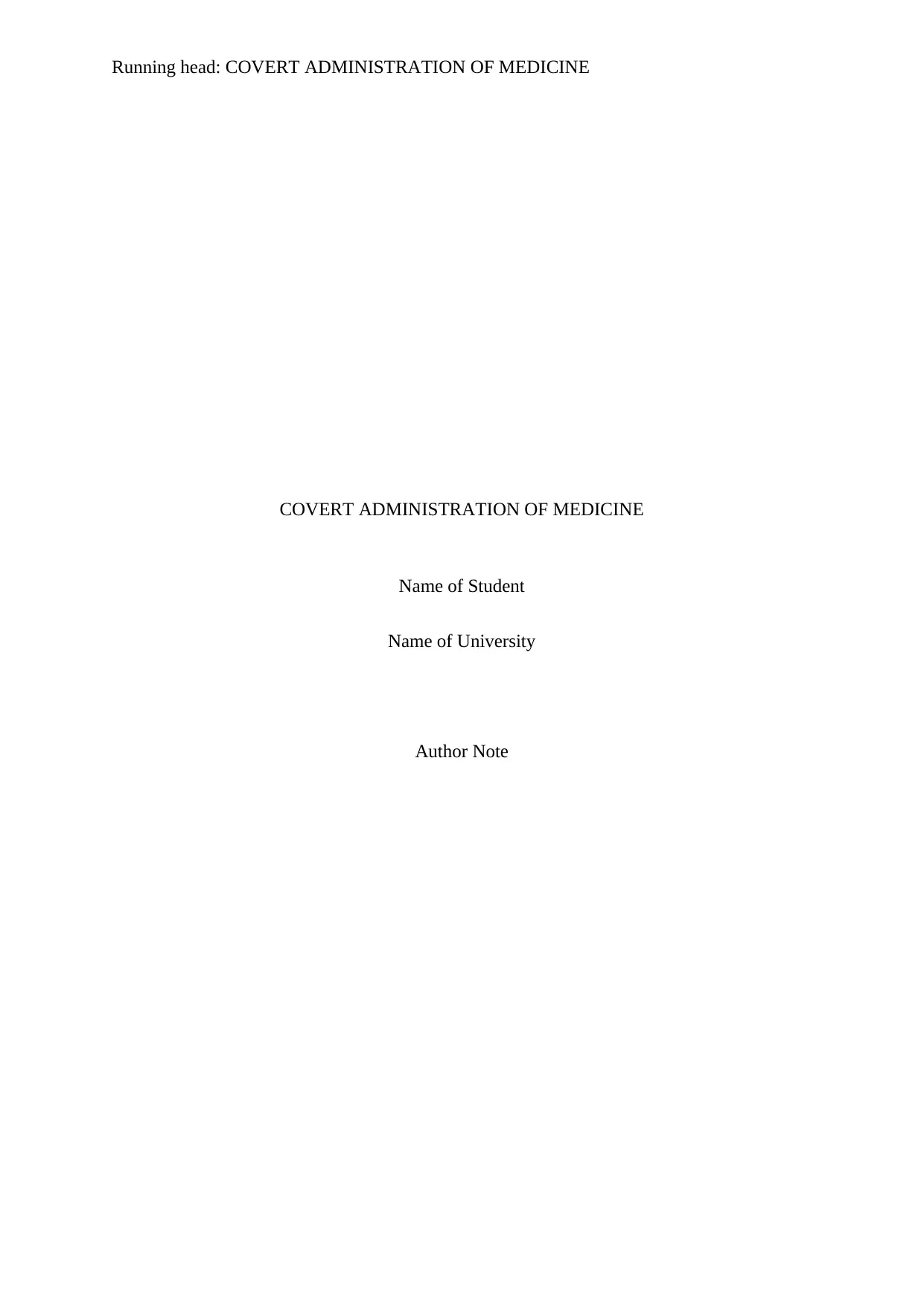
Running head: COVERT ADMINISTRATION OF MEDICINE
COVERT ADMINISTRATION OF MEDICINE
Name of Student
Name of University
Author Note
COVERT ADMINISTRATION OF MEDICINE
Name of Student
Name of University
Author Note
Paraphrase This Document
Need a fresh take? Get an instant paraphrase of this document with our AI Paraphraser
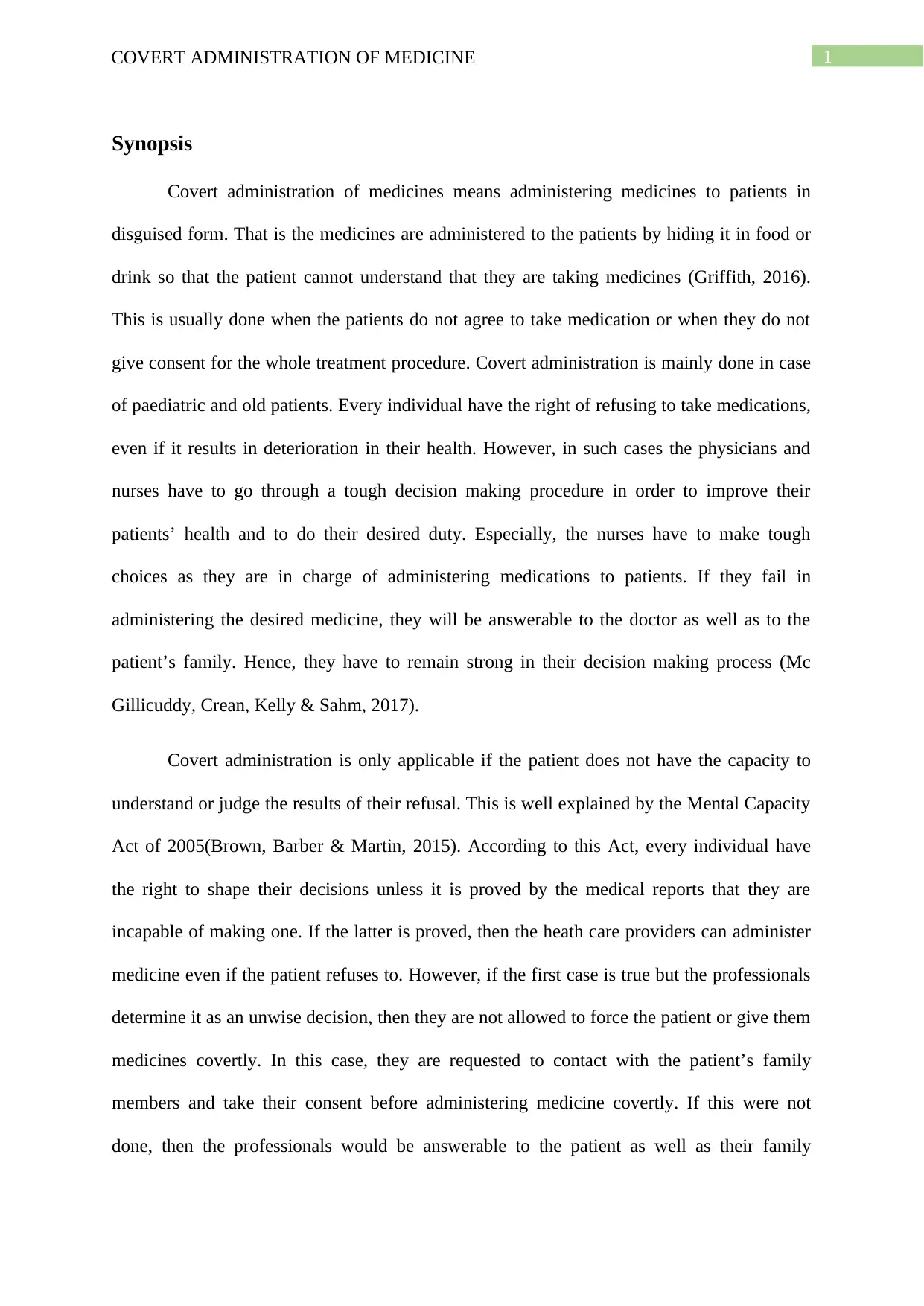
1COVERT ADMINISTRATION OF MEDICINE
Synopsis
Covert administration of medicines means administering medicines to patients in
disguised form. That is the medicines are administered to the patients by hiding it in food or
drink so that the patient cannot understand that they are taking medicines (Griffith, 2016).
This is usually done when the patients do not agree to take medication or when they do not
give consent for the whole treatment procedure. Covert administration is mainly done in case
of paediatric and old patients. Every individual have the right of refusing to take medications,
even if it results in deterioration in their health. However, in such cases the physicians and
nurses have to go through a tough decision making procedure in order to improve their
patients’ health and to do their desired duty. Especially, the nurses have to make tough
choices as they are in charge of administering medications to patients. If they fail in
administering the desired medicine, they will be answerable to the doctor as well as to the
patient’s family. Hence, they have to remain strong in their decision making process (Mc
Gillicuddy, Crean, Kelly & Sahm, 2017).
Covert administration is only applicable if the patient does not have the capacity to
understand or judge the results of their refusal. This is well explained by the Mental Capacity
Act of 2005(Brown, Barber & Martin, 2015). According to this Act, every individual have
the right to shape their decisions unless it is proved by the medical reports that they are
incapable of making one. If the latter is proved, then the heath care providers can administer
medicine even if the patient refuses to. However, if the first case is true but the professionals
determine it as an unwise decision, then they are not allowed to force the patient or give them
medicines covertly. In this case, they are requested to contact with the patient’s family
members and take their consent before administering medicine covertly. If this were not
done, then the professionals would be answerable to the patient as well as their family
Synopsis
Covert administration of medicines means administering medicines to patients in
disguised form. That is the medicines are administered to the patients by hiding it in food or
drink so that the patient cannot understand that they are taking medicines (Griffith, 2016).
This is usually done when the patients do not agree to take medication or when they do not
give consent for the whole treatment procedure. Covert administration is mainly done in case
of paediatric and old patients. Every individual have the right of refusing to take medications,
even if it results in deterioration in their health. However, in such cases the physicians and
nurses have to go through a tough decision making procedure in order to improve their
patients’ health and to do their desired duty. Especially, the nurses have to make tough
choices as they are in charge of administering medications to patients. If they fail in
administering the desired medicine, they will be answerable to the doctor as well as to the
patient’s family. Hence, they have to remain strong in their decision making process (Mc
Gillicuddy, Crean, Kelly & Sahm, 2017).
Covert administration is only applicable if the patient does not have the capacity to
understand or judge the results of their refusal. This is well explained by the Mental Capacity
Act of 2005(Brown, Barber & Martin, 2015). According to this Act, every individual have
the right to shape their decisions unless it is proved by the medical reports that they are
incapable of making one. If the latter is proved, then the heath care providers can administer
medicine even if the patient refuses to. However, if the first case is true but the professionals
determine it as an unwise decision, then they are not allowed to force the patient or give them
medicines covertly. In this case, they are requested to contact with the patient’s family
members and take their consent before administering medicine covertly. If this were not
done, then the professionals would be answerable to the patient as well as their family
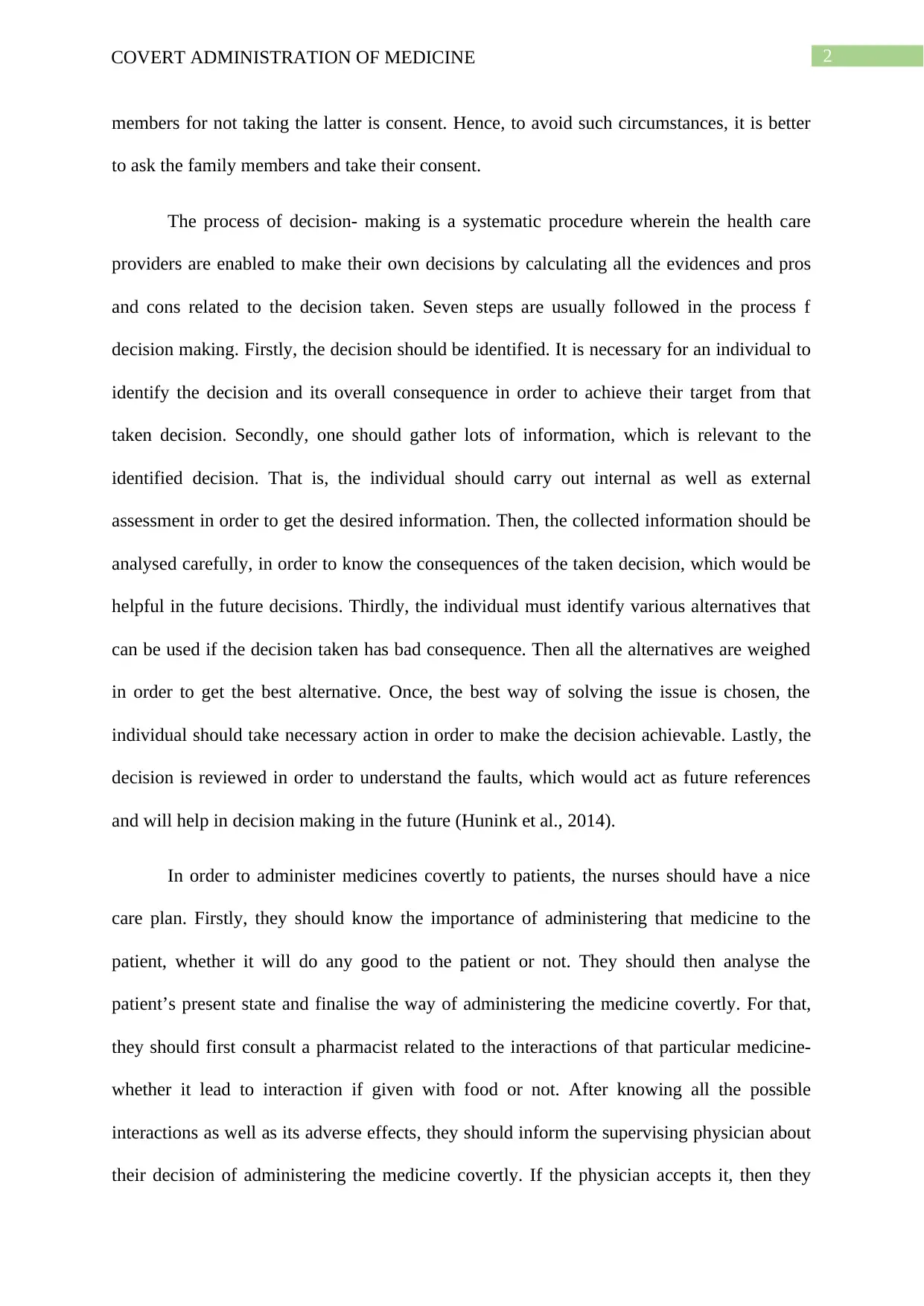
2COVERT ADMINISTRATION OF MEDICINE
members for not taking the latter is consent. Hence, to avoid such circumstances, it is better
to ask the family members and take their consent.
The process of decision- making is a systematic procedure wherein the health care
providers are enabled to make their own decisions by calculating all the evidences and pros
and cons related to the decision taken. Seven steps are usually followed in the process f
decision making. Firstly, the decision should be identified. It is necessary for an individual to
identify the decision and its overall consequence in order to achieve their target from that
taken decision. Secondly, one should gather lots of information, which is relevant to the
identified decision. That is, the individual should carry out internal as well as external
assessment in order to get the desired information. Then, the collected information should be
analysed carefully, in order to know the consequences of the taken decision, which would be
helpful in the future decisions. Thirdly, the individual must identify various alternatives that
can be used if the decision taken has bad consequence. Then all the alternatives are weighed
in order to get the best alternative. Once, the best way of solving the issue is chosen, the
individual should take necessary action in order to make the decision achievable. Lastly, the
decision is reviewed in order to understand the faults, which would act as future references
and will help in decision making in the future (Hunink et al., 2014).
In order to administer medicines covertly to patients, the nurses should have a nice
care plan. Firstly, they should know the importance of administering that medicine to the
patient, whether it will do any good to the patient or not. They should then analyse the
patient’s present state and finalise the way of administering the medicine covertly. For that,
they should first consult a pharmacist related to the interactions of that particular medicine-
whether it lead to interaction if given with food or not. After knowing all the possible
interactions as well as its adverse effects, they should inform the supervising physician about
their decision of administering the medicine covertly. If the physician accepts it, then they
members for not taking the latter is consent. Hence, to avoid such circumstances, it is better
to ask the family members and take their consent.
The process of decision- making is a systematic procedure wherein the health care
providers are enabled to make their own decisions by calculating all the evidences and pros
and cons related to the decision taken. Seven steps are usually followed in the process f
decision making. Firstly, the decision should be identified. It is necessary for an individual to
identify the decision and its overall consequence in order to achieve their target from that
taken decision. Secondly, one should gather lots of information, which is relevant to the
identified decision. That is, the individual should carry out internal as well as external
assessment in order to get the desired information. Then, the collected information should be
analysed carefully, in order to know the consequences of the taken decision, which would be
helpful in the future decisions. Thirdly, the individual must identify various alternatives that
can be used if the decision taken has bad consequence. Then all the alternatives are weighed
in order to get the best alternative. Once, the best way of solving the issue is chosen, the
individual should take necessary action in order to make the decision achievable. Lastly, the
decision is reviewed in order to understand the faults, which would act as future references
and will help in decision making in the future (Hunink et al., 2014).
In order to administer medicines covertly to patients, the nurses should have a nice
care plan. Firstly, they should know the importance of administering that medicine to the
patient, whether it will do any good to the patient or not. They should then analyse the
patient’s present state and finalise the way of administering the medicine covertly. For that,
they should first consult a pharmacist related to the interactions of that particular medicine-
whether it lead to interaction if given with food or not. After knowing all the possible
interactions as well as its adverse effects, they should inform the supervising physician about
their decision of administering the medicine covertly. If the physician accepts it, then they
⊘ This is a preview!⊘
Do you want full access?
Subscribe today to unlock all pages.

Trusted by 1+ million students worldwide
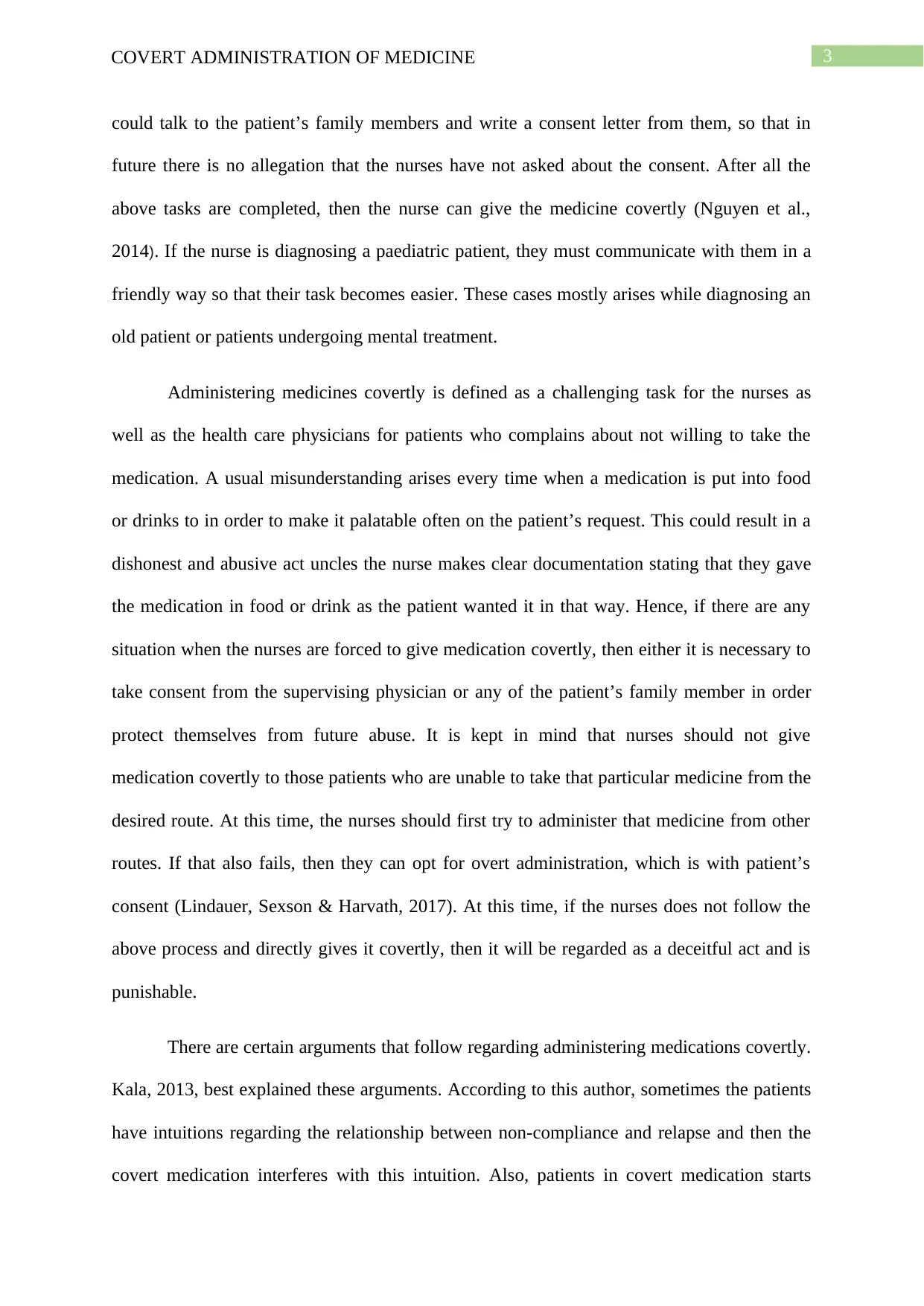
3COVERT ADMINISTRATION OF MEDICINE
could talk to the patient’s family members and write a consent letter from them, so that in
future there is no allegation that the nurses have not asked about the consent. After all the
above tasks are completed, then the nurse can give the medicine covertly (Nguyen et al.,
2014). If the nurse is diagnosing a paediatric patient, they must communicate with them in a
friendly way so that their task becomes easier. These cases mostly arises while diagnosing an
old patient or patients undergoing mental treatment.
Administering medicines covertly is defined as a challenging task for the nurses as
well as the health care physicians for patients who complains about not willing to take the
medication. A usual misunderstanding arises every time when a medication is put into food
or drinks to in order to make it palatable often on the patient’s request. This could result in a
dishonest and abusive act uncles the nurse makes clear documentation stating that they gave
the medication in food or drink as the patient wanted it in that way. Hence, if there are any
situation when the nurses are forced to give medication covertly, then either it is necessary to
take consent from the supervising physician or any of the patient’s family member in order
protect themselves from future abuse. It is kept in mind that nurses should not give
medication covertly to those patients who are unable to take that particular medicine from the
desired route. At this time, the nurses should first try to administer that medicine from other
routes. If that also fails, then they can opt for overt administration, which is with patient’s
consent (Lindauer, Sexson & Harvath, 2017). At this time, if the nurses does not follow the
above process and directly gives it covertly, then it will be regarded as a deceitful act and is
punishable.
There are certain arguments that follow regarding administering medications covertly.
Kala, 2013, best explained these arguments. According to this author, sometimes the patients
have intuitions regarding the relationship between non-compliance and relapse and then the
covert medication interferes with this intuition. Also, patients in covert medication starts
could talk to the patient’s family members and write a consent letter from them, so that in
future there is no allegation that the nurses have not asked about the consent. After all the
above tasks are completed, then the nurse can give the medicine covertly (Nguyen et al.,
2014). If the nurse is diagnosing a paediatric patient, they must communicate with them in a
friendly way so that their task becomes easier. These cases mostly arises while diagnosing an
old patient or patients undergoing mental treatment.
Administering medicines covertly is defined as a challenging task for the nurses as
well as the health care physicians for patients who complains about not willing to take the
medication. A usual misunderstanding arises every time when a medication is put into food
or drinks to in order to make it palatable often on the patient’s request. This could result in a
dishonest and abusive act uncles the nurse makes clear documentation stating that they gave
the medication in food or drink as the patient wanted it in that way. Hence, if there are any
situation when the nurses are forced to give medication covertly, then either it is necessary to
take consent from the supervising physician or any of the patient’s family member in order
protect themselves from future abuse. It is kept in mind that nurses should not give
medication covertly to those patients who are unable to take that particular medicine from the
desired route. At this time, the nurses should first try to administer that medicine from other
routes. If that also fails, then they can opt for overt administration, which is with patient’s
consent (Lindauer, Sexson & Harvath, 2017). At this time, if the nurses does not follow the
above process and directly gives it covertly, then it will be regarded as a deceitful act and is
punishable.
There are certain arguments that follow regarding administering medications covertly.
Kala, 2013, best explained these arguments. According to this author, sometimes the patients
have intuitions regarding the relationship between non-compliance and relapse and then the
covert medication interferes with this intuition. Also, patients in covert medication starts
Paraphrase This Document
Need a fresh take? Get an instant paraphrase of this document with our AI Paraphraser
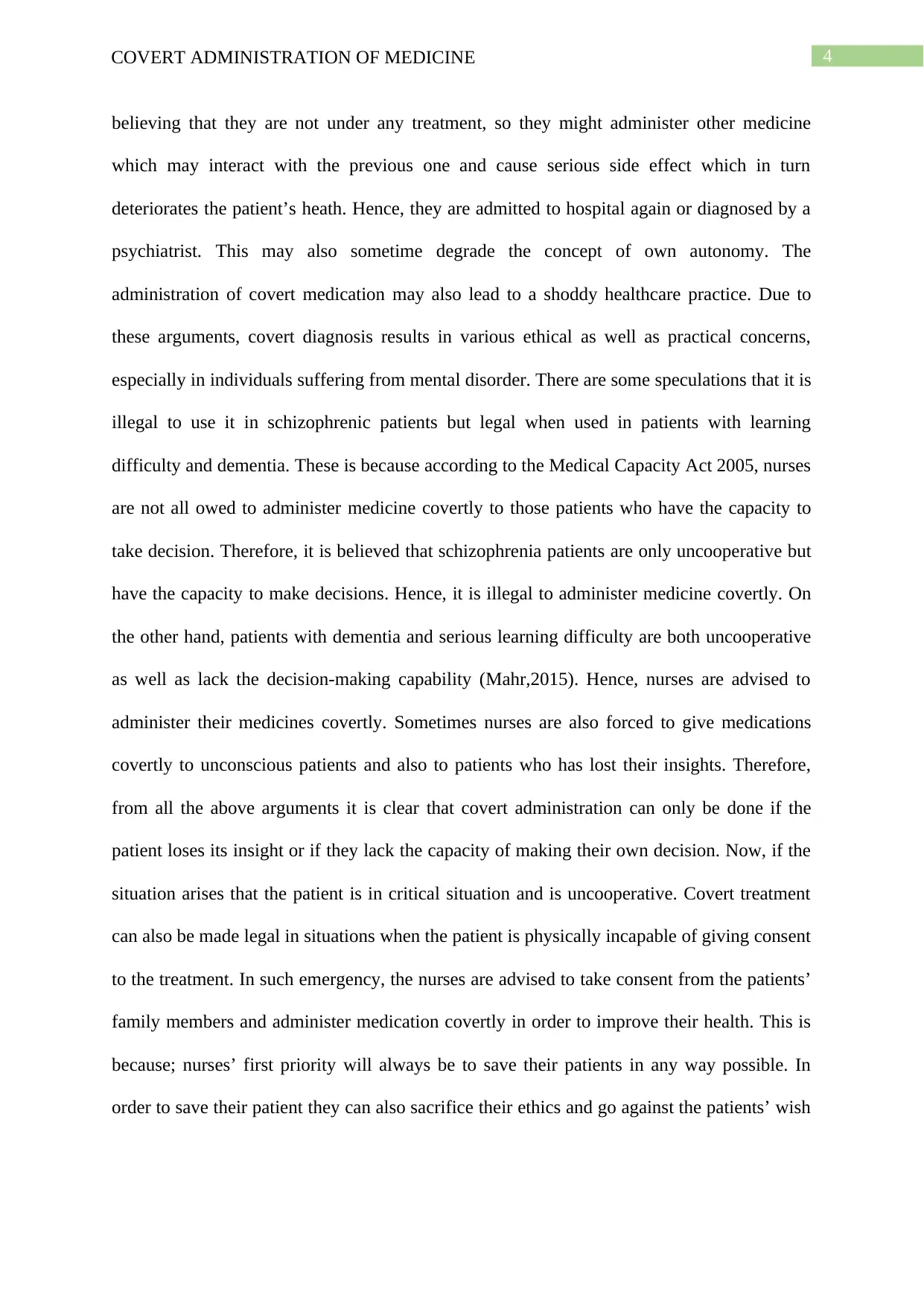
4COVERT ADMINISTRATION OF MEDICINE
believing that they are not under any treatment, so they might administer other medicine
which may interact with the previous one and cause serious side effect which in turn
deteriorates the patient’s heath. Hence, they are admitted to hospital again or diagnosed by a
psychiatrist. This may also sometime degrade the concept of own autonomy. The
administration of covert medication may also lead to a shoddy healthcare practice. Due to
these arguments, covert diagnosis results in various ethical as well as practical concerns,
especially in individuals suffering from mental disorder. There are some speculations that it is
illegal to use it in schizophrenic patients but legal when used in patients with learning
difficulty and dementia. These is because according to the Medical Capacity Act 2005, nurses
are not all owed to administer medicine covertly to those patients who have the capacity to
take decision. Therefore, it is believed that schizophrenia patients are only uncooperative but
have the capacity to make decisions. Hence, it is illegal to administer medicine covertly. On
the other hand, patients with dementia and serious learning difficulty are both uncooperative
as well as lack the decision-making capability (Mahr,2015). Hence, nurses are advised to
administer their medicines covertly. Sometimes nurses are also forced to give medications
covertly to unconscious patients and also to patients who has lost their insights. Therefore,
from all the above arguments it is clear that covert administration can only be done if the
patient loses its insight or if they lack the capacity of making their own decision. Now, if the
situation arises that the patient is in critical situation and is uncooperative. Covert treatment
can also be made legal in situations when the patient is physically incapable of giving consent
to the treatment. In such emergency, the nurses are advised to take consent from the patients’
family members and administer medication covertly in order to improve their health. This is
because; nurses’ first priority will always be to save their patients in any way possible. In
order to save their patient they can also sacrifice their ethics and go against the patients’ wish
believing that they are not under any treatment, so they might administer other medicine
which may interact with the previous one and cause serious side effect which in turn
deteriorates the patient’s heath. Hence, they are admitted to hospital again or diagnosed by a
psychiatrist. This may also sometime degrade the concept of own autonomy. The
administration of covert medication may also lead to a shoddy healthcare practice. Due to
these arguments, covert diagnosis results in various ethical as well as practical concerns,
especially in individuals suffering from mental disorder. There are some speculations that it is
illegal to use it in schizophrenic patients but legal when used in patients with learning
difficulty and dementia. These is because according to the Medical Capacity Act 2005, nurses
are not all owed to administer medicine covertly to those patients who have the capacity to
take decision. Therefore, it is believed that schizophrenia patients are only uncooperative but
have the capacity to make decisions. Hence, it is illegal to administer medicine covertly. On
the other hand, patients with dementia and serious learning difficulty are both uncooperative
as well as lack the decision-making capability (Mahr,2015). Hence, nurses are advised to
administer their medicines covertly. Sometimes nurses are also forced to give medications
covertly to unconscious patients and also to patients who has lost their insights. Therefore,
from all the above arguments it is clear that covert administration can only be done if the
patient loses its insight or if they lack the capacity of making their own decision. Now, if the
situation arises that the patient is in critical situation and is uncooperative. Covert treatment
can also be made legal in situations when the patient is physically incapable of giving consent
to the treatment. In such emergency, the nurses are advised to take consent from the patients’
family members and administer medication covertly in order to improve their health. This is
because; nurses’ first priority will always be to save their patients in any way possible. In
order to save their patient they can also sacrifice their ethics and go against the patients’ wish
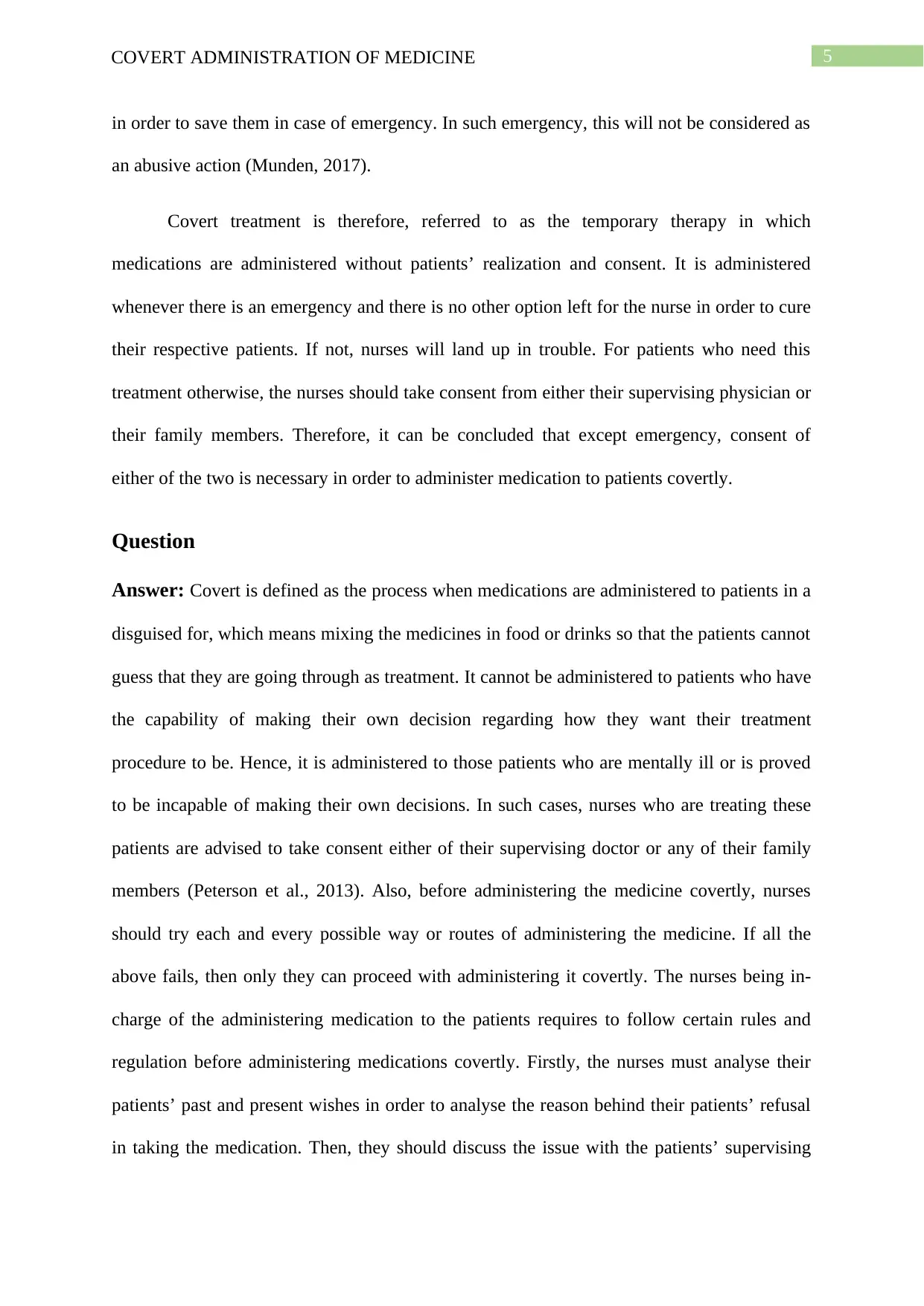
5COVERT ADMINISTRATION OF MEDICINE
in order to save them in case of emergency. In such emergency, this will not be considered as
an abusive action (Munden, 2017).
Covert treatment is therefore, referred to as the temporary therapy in which
medications are administered without patients’ realization and consent. It is administered
whenever there is an emergency and there is no other option left for the nurse in order to cure
their respective patients. If not, nurses will land up in trouble. For patients who need this
treatment otherwise, the nurses should take consent from either their supervising physician or
their family members. Therefore, it can be concluded that except emergency, consent of
either of the two is necessary in order to administer medication to patients covertly.
Question
Answer: Covert is defined as the process when medications are administered to patients in a
disguised for, which means mixing the medicines in food or drinks so that the patients cannot
guess that they are going through as treatment. It cannot be administered to patients who have
the capability of making their own decision regarding how they want their treatment
procedure to be. Hence, it is administered to those patients who are mentally ill or is proved
to be incapable of making their own decisions. In such cases, nurses who are treating these
patients are advised to take consent either of their supervising doctor or any of their family
members (Peterson et al., 2013). Also, before administering the medicine covertly, nurses
should try each and every possible way or routes of administering the medicine. If all the
above fails, then only they can proceed with administering it covertly. The nurses being in-
charge of the administering medication to the patients requires to follow certain rules and
regulation before administering medications covertly. Firstly, the nurses must analyse their
patients’ past and present wishes in order to analyse the reason behind their patients’ refusal
in taking the medication. Then, they should discuss the issue with the patients’ supervising
in order to save them in case of emergency. In such emergency, this will not be considered as
an abusive action (Munden, 2017).
Covert treatment is therefore, referred to as the temporary therapy in which
medications are administered without patients’ realization and consent. It is administered
whenever there is an emergency and there is no other option left for the nurse in order to cure
their respective patients. If not, nurses will land up in trouble. For patients who need this
treatment otherwise, the nurses should take consent from either their supervising physician or
their family members. Therefore, it can be concluded that except emergency, consent of
either of the two is necessary in order to administer medication to patients covertly.
Question
Answer: Covert is defined as the process when medications are administered to patients in a
disguised for, which means mixing the medicines in food or drinks so that the patients cannot
guess that they are going through as treatment. It cannot be administered to patients who have
the capability of making their own decision regarding how they want their treatment
procedure to be. Hence, it is administered to those patients who are mentally ill or is proved
to be incapable of making their own decisions. In such cases, nurses who are treating these
patients are advised to take consent either of their supervising doctor or any of their family
members (Peterson et al., 2013). Also, before administering the medicine covertly, nurses
should try each and every possible way or routes of administering the medicine. If all the
above fails, then only they can proceed with administering it covertly. The nurses being in-
charge of the administering medication to the patients requires to follow certain rules and
regulation before administering medications covertly. Firstly, the nurses must analyse their
patients’ past and present wishes in order to analyse the reason behind their patients’ refusal
in taking the medication. Then, they should discuss the issue with the patients’ supervising
⊘ This is a preview!⊘
Do you want full access?
Subscribe today to unlock all pages.

Trusted by 1+ million students worldwide
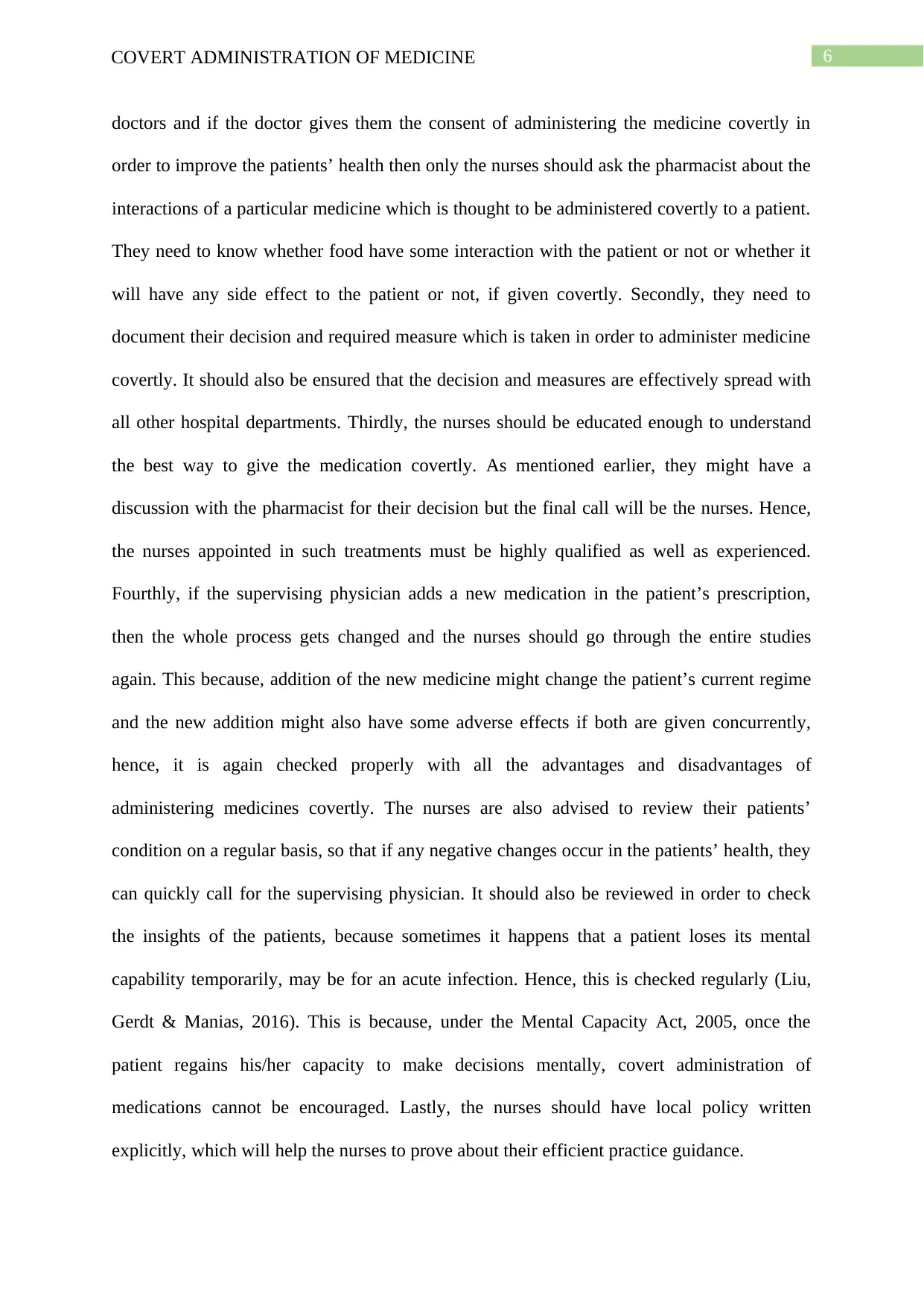
6COVERT ADMINISTRATION OF MEDICINE
doctors and if the doctor gives them the consent of administering the medicine covertly in
order to improve the patients’ health then only the nurses should ask the pharmacist about the
interactions of a particular medicine which is thought to be administered covertly to a patient.
They need to know whether food have some interaction with the patient or not or whether it
will have any side effect to the patient or not, if given covertly. Secondly, they need to
document their decision and required measure which is taken in order to administer medicine
covertly. It should also be ensured that the decision and measures are effectively spread with
all other hospital departments. Thirdly, the nurses should be educated enough to understand
the best way to give the medication covertly. As mentioned earlier, they might have a
discussion with the pharmacist for their decision but the final call will be the nurses. Hence,
the nurses appointed in such treatments must be highly qualified as well as experienced.
Fourthly, if the supervising physician adds a new medication in the patient’s prescription,
then the whole process gets changed and the nurses should go through the entire studies
again. This because, addition of the new medicine might change the patient’s current regime
and the new addition might also have some adverse effects if both are given concurrently,
hence, it is again checked properly with all the advantages and disadvantages of
administering medicines covertly. The nurses are also advised to review their patients’
condition on a regular basis, so that if any negative changes occur in the patients’ health, they
can quickly call for the supervising physician. It should also be reviewed in order to check
the insights of the patients, because sometimes it happens that a patient loses its mental
capability temporarily, may be for an acute infection. Hence, this is checked regularly (Liu,
Gerdt & Manias, 2016). This is because, under the Mental Capacity Act, 2005, once the
patient regains his/her capacity to make decisions mentally, covert administration of
medications cannot be encouraged. Lastly, the nurses should have local policy written
explicitly, which will help the nurses to prove about their efficient practice guidance.
doctors and if the doctor gives them the consent of administering the medicine covertly in
order to improve the patients’ health then only the nurses should ask the pharmacist about the
interactions of a particular medicine which is thought to be administered covertly to a patient.
They need to know whether food have some interaction with the patient or not or whether it
will have any side effect to the patient or not, if given covertly. Secondly, they need to
document their decision and required measure which is taken in order to administer medicine
covertly. It should also be ensured that the decision and measures are effectively spread with
all other hospital departments. Thirdly, the nurses should be educated enough to understand
the best way to give the medication covertly. As mentioned earlier, they might have a
discussion with the pharmacist for their decision but the final call will be the nurses. Hence,
the nurses appointed in such treatments must be highly qualified as well as experienced.
Fourthly, if the supervising physician adds a new medication in the patient’s prescription,
then the whole process gets changed and the nurses should go through the entire studies
again. This because, addition of the new medicine might change the patient’s current regime
and the new addition might also have some adverse effects if both are given concurrently,
hence, it is again checked properly with all the advantages and disadvantages of
administering medicines covertly. The nurses are also advised to review their patients’
condition on a regular basis, so that if any negative changes occur in the patients’ health, they
can quickly call for the supervising physician. It should also be reviewed in order to check
the insights of the patients, because sometimes it happens that a patient loses its mental
capability temporarily, may be for an acute infection. Hence, this is checked regularly (Liu,
Gerdt & Manias, 2016). This is because, under the Mental Capacity Act, 2005, once the
patient regains his/her capacity to make decisions mentally, covert administration of
medications cannot be encouraged. Lastly, the nurses should have local policy written
explicitly, which will help the nurses to prove about their efficient practice guidance.
Paraphrase This Document
Need a fresh take? Get an instant paraphrase of this document with our AI Paraphraser
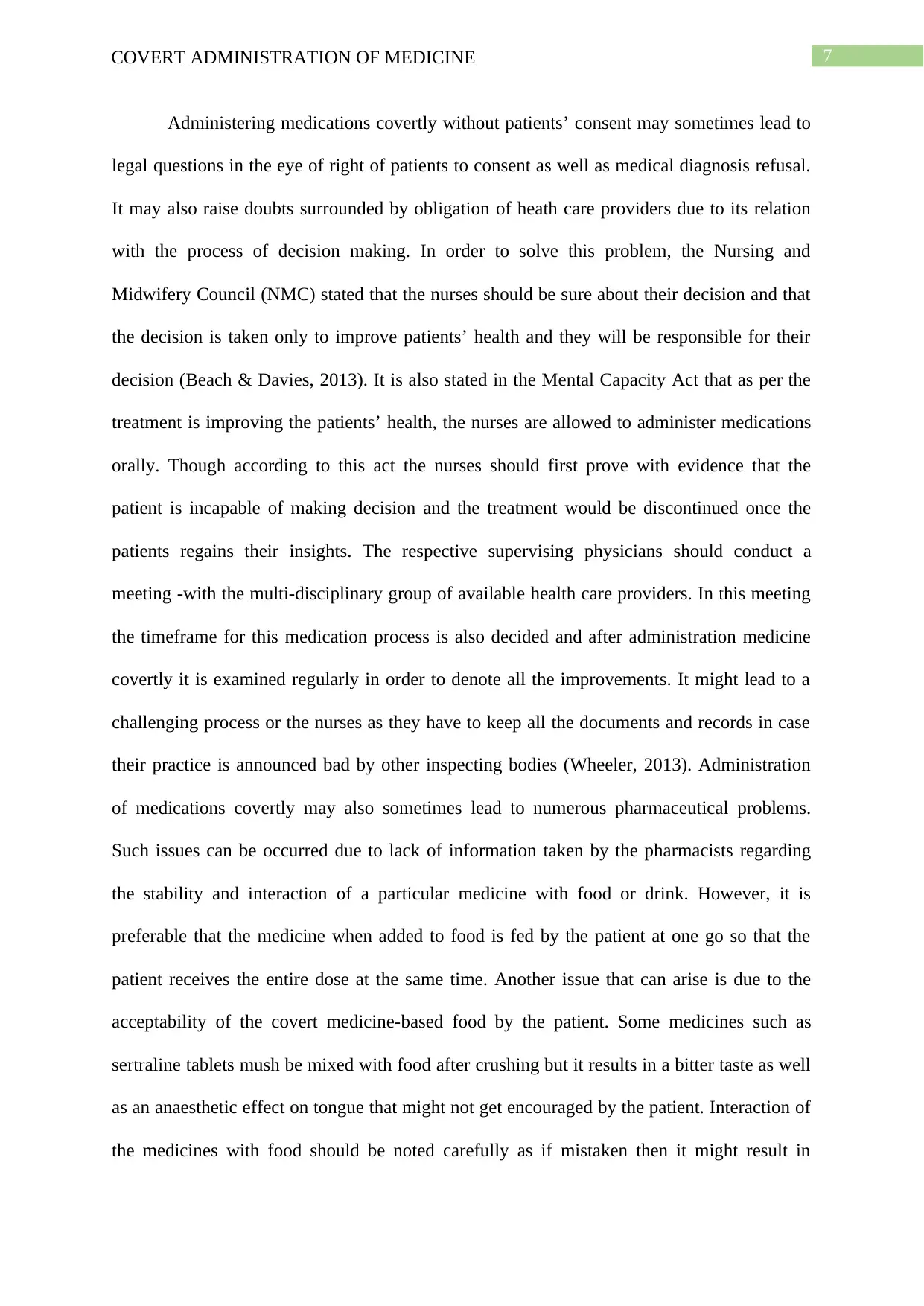
7COVERT ADMINISTRATION OF MEDICINE
Administering medications covertly without patients’ consent may sometimes lead to
legal questions in the eye of right of patients to consent as well as medical diagnosis refusal.
It may also raise doubts surrounded by obligation of heath care providers due to its relation
with the process of decision making. In order to solve this problem, the Nursing and
Midwifery Council (NMC) stated that the nurses should be sure about their decision and that
the decision is taken only to improve patients’ health and they will be responsible for their
decision (Beach & Davies, 2013). It is also stated in the Mental Capacity Act that as per the
treatment is improving the patients’ health, the nurses are allowed to administer medications
orally. Though according to this act the nurses should first prove with evidence that the
patient is incapable of making decision and the treatment would be discontinued once the
patients regains their insights. The respective supervising physicians should conduct a
meeting -with the multi-disciplinary group of available health care providers. In this meeting
the timeframe for this medication process is also decided and after administration medicine
covertly it is examined regularly in order to denote all the improvements. It might lead to a
challenging process or the nurses as they have to keep all the documents and records in case
their practice is announced bad by other inspecting bodies (Wheeler, 2013). Administration
of medications covertly may also sometimes lead to numerous pharmaceutical problems.
Such issues can be occurred due to lack of information taken by the pharmacists regarding
the stability and interaction of a particular medicine with food or drink. However, it is
preferable that the medicine when added to food is fed by the patient at one go so that the
patient receives the entire dose at the same time. Another issue that can arise is due to the
acceptability of the covert medicine-based food by the patient. Some medicines such as
sertraline tablets mush be mixed with food after crushing but it results in a bitter taste as well
as an anaesthetic effect on tongue that might not get encouraged by the patient. Interaction of
the medicines with food should be noted carefully as if mistaken then it might result in
Administering medications covertly without patients’ consent may sometimes lead to
legal questions in the eye of right of patients to consent as well as medical diagnosis refusal.
It may also raise doubts surrounded by obligation of heath care providers due to its relation
with the process of decision making. In order to solve this problem, the Nursing and
Midwifery Council (NMC) stated that the nurses should be sure about their decision and that
the decision is taken only to improve patients’ health and they will be responsible for their
decision (Beach & Davies, 2013). It is also stated in the Mental Capacity Act that as per the
treatment is improving the patients’ health, the nurses are allowed to administer medications
orally. Though according to this act the nurses should first prove with evidence that the
patient is incapable of making decision and the treatment would be discontinued once the
patients regains their insights. The respective supervising physicians should conduct a
meeting -with the multi-disciplinary group of available health care providers. In this meeting
the timeframe for this medication process is also decided and after administration medicine
covertly it is examined regularly in order to denote all the improvements. It might lead to a
challenging process or the nurses as they have to keep all the documents and records in case
their practice is announced bad by other inspecting bodies (Wheeler, 2013). Administration
of medications covertly may also sometimes lead to numerous pharmaceutical problems.
Such issues can be occurred due to lack of information taken by the pharmacists regarding
the stability and interaction of a particular medicine with food or drink. However, it is
preferable that the medicine when added to food is fed by the patient at one go so that the
patient receives the entire dose at the same time. Another issue that can arise is due to the
acceptability of the covert medicine-based food by the patient. Some medicines such as
sertraline tablets mush be mixed with food after crushing but it results in a bitter taste as well
as an anaesthetic effect on tongue that might not get encouraged by the patient. Interaction of
the medicines with food should be noted carefully as if mistaken then it might result in
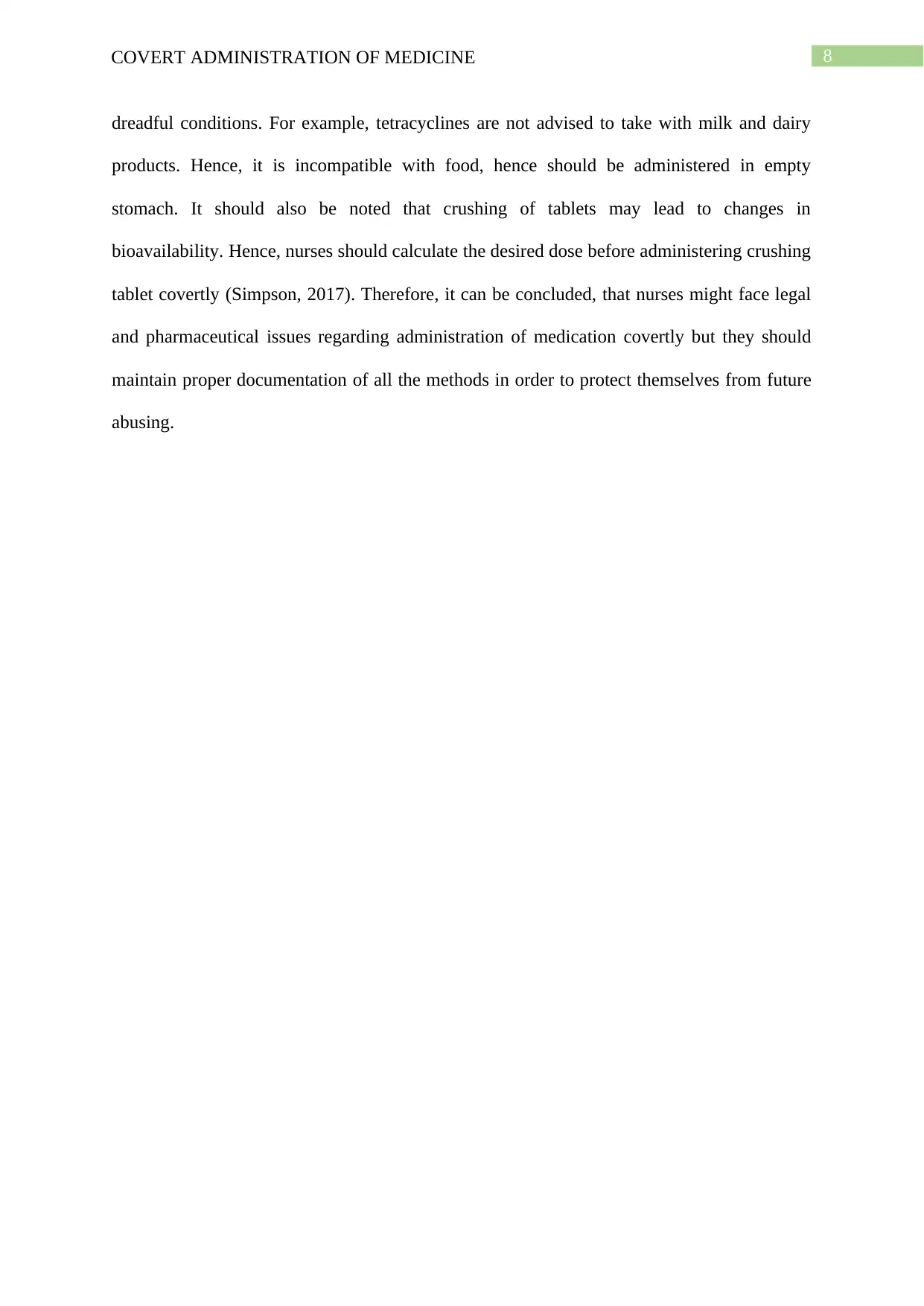
8COVERT ADMINISTRATION OF MEDICINE
dreadful conditions. For example, tetracyclines are not advised to take with milk and dairy
products. Hence, it is incompatible with food, hence should be administered in empty
stomach. It should also be noted that crushing of tablets may lead to changes in
bioavailability. Hence, nurses should calculate the desired dose before administering crushing
tablet covertly (Simpson, 2017). Therefore, it can be concluded, that nurses might face legal
and pharmaceutical issues regarding administration of medication covertly but they should
maintain proper documentation of all the methods in order to protect themselves from future
abusing.
dreadful conditions. For example, tetracyclines are not advised to take with milk and dairy
products. Hence, it is incompatible with food, hence should be administered in empty
stomach. It should also be noted that crushing of tablets may lead to changes in
bioavailability. Hence, nurses should calculate the desired dose before administering crushing
tablet covertly (Simpson, 2017). Therefore, it can be concluded, that nurses might face legal
and pharmaceutical issues regarding administration of medication covertly but they should
maintain proper documentation of all the methods in order to protect themselves from future
abusing.
⊘ This is a preview!⊘
Do you want full access?
Subscribe today to unlock all pages.

Trusted by 1+ million students worldwide
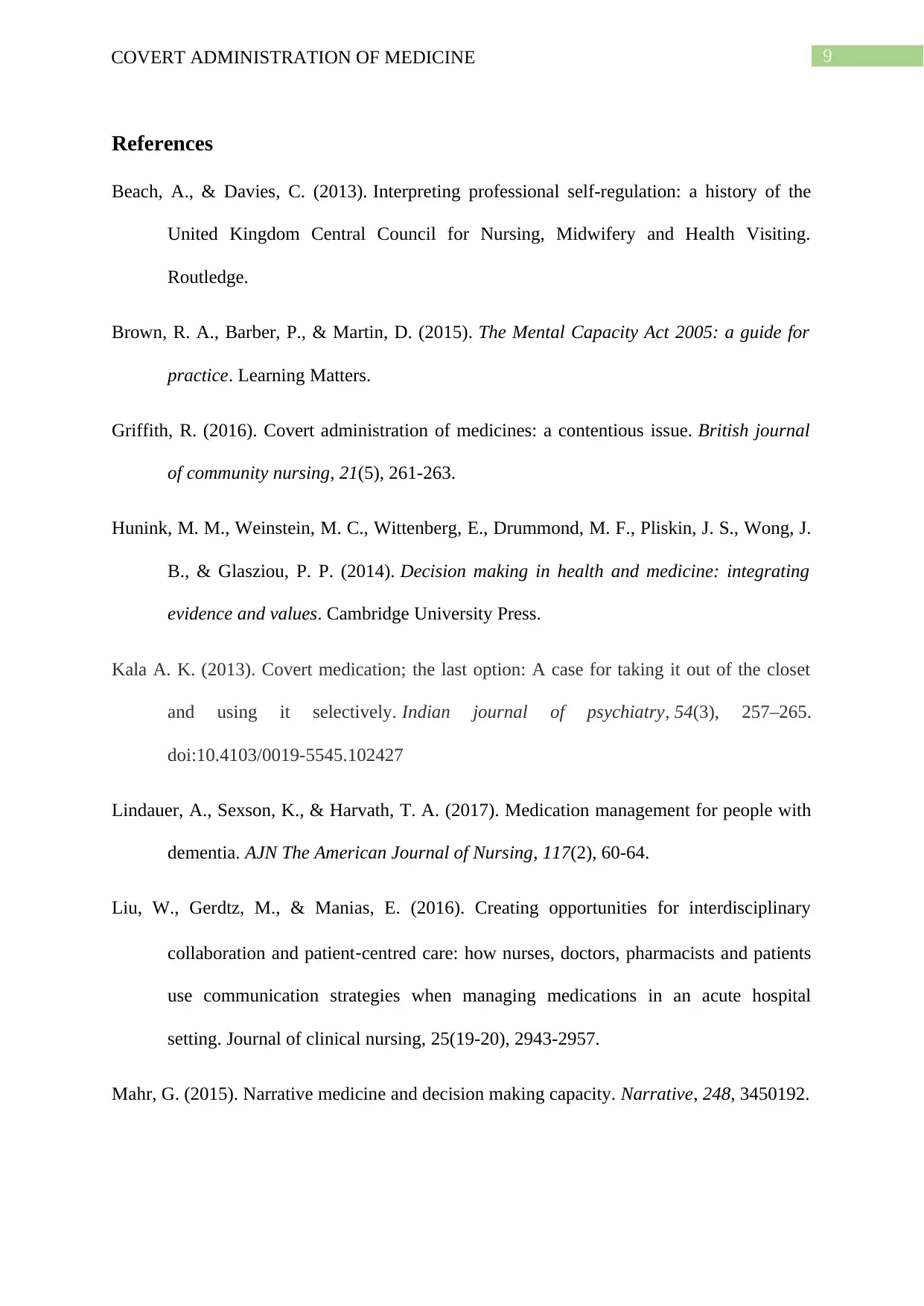
9COVERT ADMINISTRATION OF MEDICINE
References
Beach, A., & Davies, C. (2013). Interpreting professional self-regulation: a history of the
United Kingdom Central Council for Nursing, Midwifery and Health Visiting.
Routledge.
Brown, R. A., Barber, P., & Martin, D. (2015). The Mental Capacity Act 2005: a guide for
practice. Learning Matters.
Griffith, R. (2016). Covert administration of medicines: a contentious issue. British journal
of community nursing, 21(5), 261-263.
Hunink, M. M., Weinstein, M. C., Wittenberg, E., Drummond, M. F., Pliskin, J. S., Wong, J.
B., & Glasziou, P. P. (2014). Decision making in health and medicine: integrating
evidence and values. Cambridge University Press.
Kala A. K. (2013). Covert medication; the last option: A case for taking it out of the closet
and using it selectively. Indian journal of psychiatry, 54(3), 257–265.
doi:10.4103/0019-5545.102427
Lindauer, A., Sexson, K., & Harvath, T. A. (2017). Medication management for people with
dementia. AJN The American Journal of Nursing, 117(2), 60-64.
Liu, W., Gerdtz, M., & Manias, E. (2016). Creating opportunities for interdisciplinary
collaboration and patient‐centred care: how nurses, doctors, pharmacists and patients
use communication strategies when managing medications in an acute hospital
setting. Journal of clinical nursing, 25(19-20), 2943-2957.
Mahr, G. (2015). Narrative medicine and decision making capacity. Narrative, 248, 3450192.
References
Beach, A., & Davies, C. (2013). Interpreting professional self-regulation: a history of the
United Kingdom Central Council for Nursing, Midwifery and Health Visiting.
Routledge.
Brown, R. A., Barber, P., & Martin, D. (2015). The Mental Capacity Act 2005: a guide for
practice. Learning Matters.
Griffith, R. (2016). Covert administration of medicines: a contentious issue. British journal
of community nursing, 21(5), 261-263.
Hunink, M. M., Weinstein, M. C., Wittenberg, E., Drummond, M. F., Pliskin, J. S., Wong, J.
B., & Glasziou, P. P. (2014). Decision making in health and medicine: integrating
evidence and values. Cambridge University Press.
Kala A. K. (2013). Covert medication; the last option: A case for taking it out of the closet
and using it selectively. Indian journal of psychiatry, 54(3), 257–265.
doi:10.4103/0019-5545.102427
Lindauer, A., Sexson, K., & Harvath, T. A. (2017). Medication management for people with
dementia. AJN The American Journal of Nursing, 117(2), 60-64.
Liu, W., Gerdtz, M., & Manias, E. (2016). Creating opportunities for interdisciplinary
collaboration and patient‐centred care: how nurses, doctors, pharmacists and patients
use communication strategies when managing medications in an acute hospital
setting. Journal of clinical nursing, 25(19-20), 2943-2957.
Mahr, G. (2015). Narrative medicine and decision making capacity. Narrative, 248, 3450192.
Paraphrase This Document
Need a fresh take? Get an instant paraphrase of this document with our AI Paraphraser
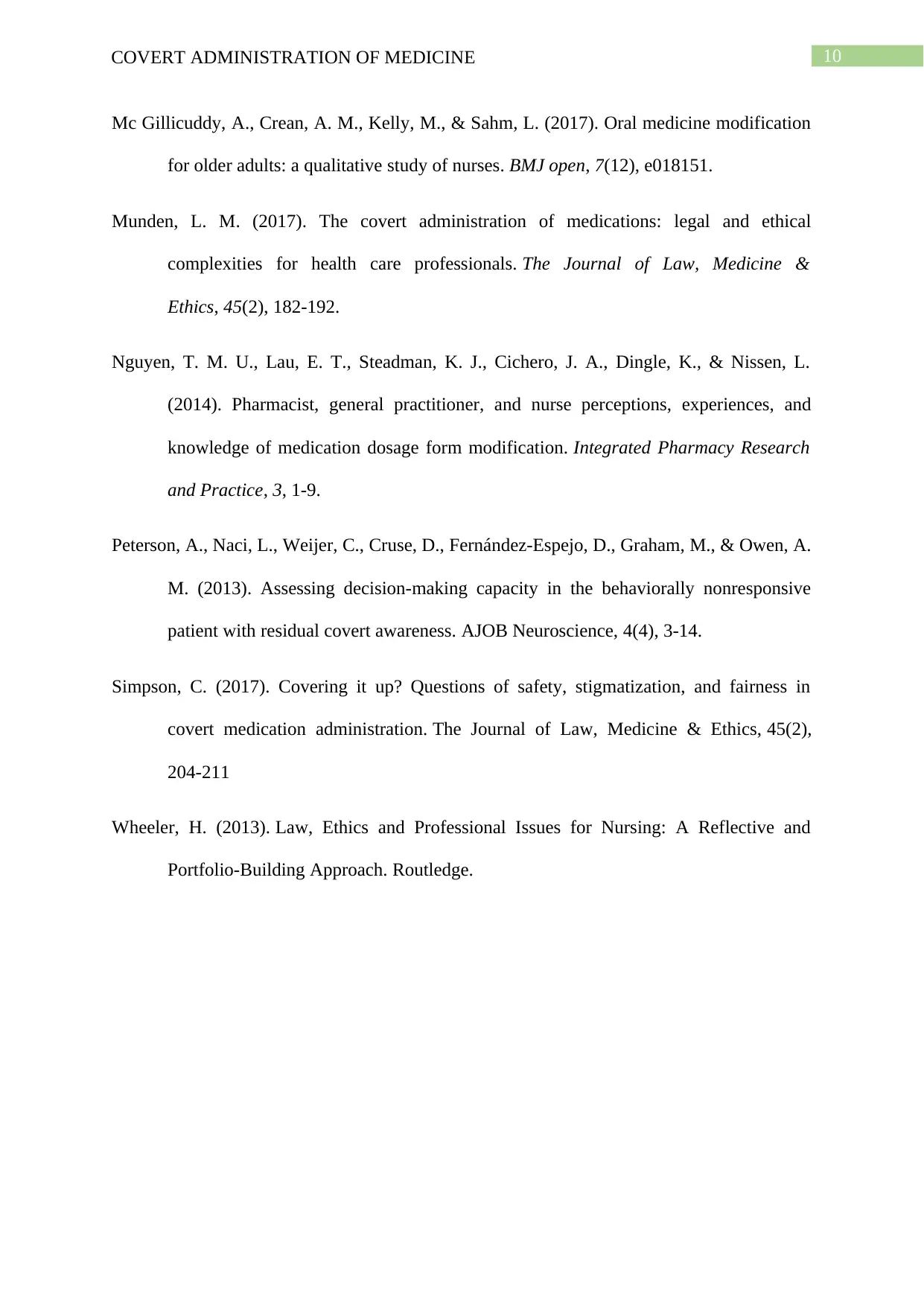
10COVERT ADMINISTRATION OF MEDICINE
Mc Gillicuddy, A., Crean, A. M., Kelly, M., & Sahm, L. (2017). Oral medicine modification
for older adults: a qualitative study of nurses. BMJ open, 7(12), e018151.
Munden, L. M. (2017). The covert administration of medications: legal and ethical
complexities for health care professionals. The Journal of Law, Medicine &
Ethics, 45(2), 182-192.
Nguyen, T. M. U., Lau, E. T., Steadman, K. J., Cichero, J. A., Dingle, K., & Nissen, L.
(2014). Pharmacist, general practitioner, and nurse perceptions, experiences, and
knowledge of medication dosage form modification. Integrated Pharmacy Research
and Practice, 3, 1-9.
Peterson, A., Naci, L., Weijer, C., Cruse, D., Fernández-Espejo, D., Graham, M., & Owen, A.
M. (2013). Assessing decision-making capacity in the behaviorally nonresponsive
patient with residual covert awareness. AJOB Neuroscience, 4(4), 3-14.
Simpson, C. (2017). Covering it up? Questions of safety, stigmatization, and fairness in
covert medication administration. The Journal of Law, Medicine & Ethics, 45(2),
204-211
Wheeler, H. (2013). Law, Ethics and Professional Issues for Nursing: A Reflective and
Portfolio-Building Approach. Routledge.
Mc Gillicuddy, A., Crean, A. M., Kelly, M., & Sahm, L. (2017). Oral medicine modification
for older adults: a qualitative study of nurses. BMJ open, 7(12), e018151.
Munden, L. M. (2017). The covert administration of medications: legal and ethical
complexities for health care professionals. The Journal of Law, Medicine &
Ethics, 45(2), 182-192.
Nguyen, T. M. U., Lau, E. T., Steadman, K. J., Cichero, J. A., Dingle, K., & Nissen, L.
(2014). Pharmacist, general practitioner, and nurse perceptions, experiences, and
knowledge of medication dosage form modification. Integrated Pharmacy Research
and Practice, 3, 1-9.
Peterson, A., Naci, L., Weijer, C., Cruse, D., Fernández-Espejo, D., Graham, M., & Owen, A.
M. (2013). Assessing decision-making capacity in the behaviorally nonresponsive
patient with residual covert awareness. AJOB Neuroscience, 4(4), 3-14.
Simpson, C. (2017). Covering it up? Questions of safety, stigmatization, and fairness in
covert medication administration. The Journal of Law, Medicine & Ethics, 45(2),
204-211
Wheeler, H. (2013). Law, Ethics and Professional Issues for Nursing: A Reflective and
Portfolio-Building Approach. Routledge.
1 out of 11
Related Documents
Your All-in-One AI-Powered Toolkit for Academic Success.
+13062052269
info@desklib.com
Available 24*7 on WhatsApp / Email
![[object Object]](/_next/static/media/star-bottom.7253800d.svg)
Unlock your academic potential
Copyright © 2020–2026 A2Z Services. All Rights Reserved. Developed and managed by ZUCOL.





